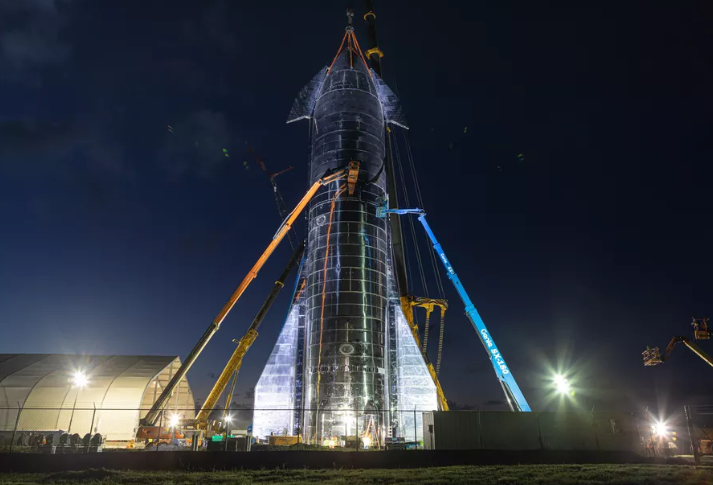
SpaceX CEO Elon Musk would like his Starship spacecraft to make it to orbit in six months, he said during an evening presentation on September 28. The event seemed aimed squarely at fans, with little new information and a lot of SpaceX history.
“This is going to sound totally nuts, but I think we want to try to reach orbit in less than six months,” Musk said. “Provided the rate of design improvement and manufacturing improvement continues to be exponential, I think that is accurate to within a few months.”
During the presentation at SpaceX’s testing facility near Boca Chica, Texas, just north of the US-Mexico border, Musk also said that he expected the Starship prototype towering behind him to do controlled ‘hops’ in a few months up to an altitude of 65,000 feet. Once that milestone is reached, Musk indicated the next flight goal would be achieving orbit.
A rendering of Starship displayed at the presentation indicated that the ship will have a length of 50 meters (about 164 feet) and a diameter of nine meters (about 30 feet), and should eventually be able to lift a payload of 150 tons. The Starship will be launched into space by a massive rocket called the Super Heavy. The Super Heavy will also be nine meters in diameter, with a length of 68 meters (223 feet.)
The Super Heavy will be able to contain up to 37 Raptor engines, according to Musk. But, he added, “I’m not sure we’ll go that high.” Musk said the number of engines could vary depending on the mission, and indicated that the minimum number of engines for the booster could be about 24.
For the most part, Musk wasn’t announcing anything new. He discussed Starship design decisions that had already been announced, including his decision from earlier this year to switch the material used to construct Starship from carbon fiber to steel. He also showed clips of past SpaceX achievements, including the first Falcon Heavy launch in 2018, and the successful ‘hop’ of it’s prototype Starhopper test vehicle in August.
One potential reason for the nostalgic emphasis was standing next to the gleaming stainless steel prototype of the Starship — a much smaller SpaceX spacecraft, the Falcon 1. Eleven years ago, the Falcon 1 became the first private liquid-fueled rocket to make it to orbit on September 28, 2008.
“If that launch had not succeeded that would have been the end of SpaceX” Musk said. Instead, the company has now had 78 successful launches, and is still aiming to do many more.
Several times during the night, and on Twitter earlier this week, Musk said that his ultimate focus was to allow humans to eventually inhabit other worlds. But while he pushes his company to pursue that ambition, one of SpaceX’s biggest customers appears eager for his focus to be on human spaceflight projects closer to home.
SpaceX is building a different spacecraft, the Crew Dragon, for NASA’s Commercial Crew Program. That project has been delayed repeatedly, including a setback earlier this year after an explosion on a test vehicle caused by a leaky valve. The timeline of the project is now once again in flux, even as NASA pushes ahead on an ambitious plan to land humans on the Moon again by 2024.
On Friday, tension between the two projects surfaced when NASA Administrator Jim Bridenstine tweeted a statement related to SpaceX’s Saturday event. While Bridenstine mentioned that he looked forward to the presentation, he also mentioned that NASA’s Commercial Crew program is years behind schedule. “NASA expects to see the same level of enthusiasm focused on the investments of the American taxpayer,” he said. “It’s time to deliver.”
On Saturday, Musk responded, saying that less than five percent of the company was working on Starship. “To be clear, the vast majority of our resources are [focused] on Falcon and Dragon, especially Crew Dragon.” Musk said.
